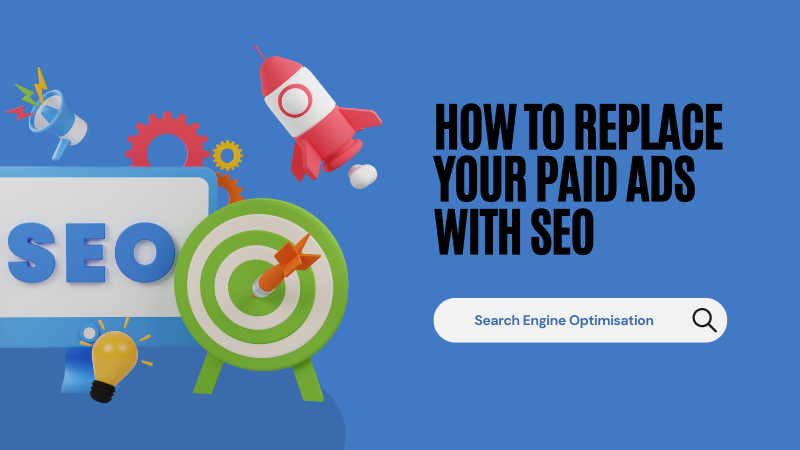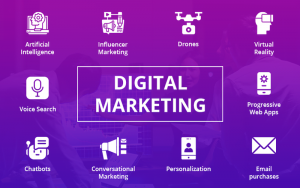How to Replace Your Paid Ads With SEO- Blogs Year

Search Engine Optimization (SEO) is a powerful and sustainable alternative to paid advertising that has garnered immense popularity as a result of its organic nature. By understanding and optimizing for search engine algorithms, businesses can secure top positions in search engine results, attract highly targeted organic traffic, and establish a strong online presence without significantly relying on advertising expenses.
Also Read:- Ecommerce SEO – Get Traffic to Your Online Store Top 4 Factors
The transition from paid ads to SEO is more than a tactical change; it represents a fundamental shift in how businesses approach online marketing. Here’s a closer look at the path to organic triumph and the advantages it offers:
Replacing paid ads with SEO is a strategic move that can help your business achieve organic growth, increase brand visibility, and potentially reduce marketing costs in the long run. However, it’s important to note that while SEO can be more sustainable, it’s also a long-term strategy that might not produce immediate results like paid advertising does. If you’re considering making this transition, follow these steps:
- Audit Your Current Situation:
- Analyze the performance of your paid ads: Which keywords and ads are bringing the most conversions?
- Identify your target audience, demographics, and user intent behind each successful keyword.
- Keyword Research:
- Using tools like Google’s Keyword Planner, SEMrush, or Ahrefs, identify high-volume, relevant keywords related to your business.
- Look for long-tail keywords (phrases that are longer and more specific) as they might have less competition and cater to a more targeted audience.
- Optimize Your Website:
- On-Page SEO: Ensure that your content is relevant and optimized for your target keywords. This includes meta tags, headers, alt tags for images, and content.
- Technical SEO: Improve site speed, ensure mobile-friendliness, utilize schema markup, and create an XML sitemap.
- User Experience: Navigation should be intuitive, and content should be engaging and valuable to users.
- Create Quality Content:
- Create a content strategy around your target keywords. This might include blog posts, videos, infographics, and other forms of content.
- Remember, content should be written for users first, and search engines second. Prioritize value and relevancy.
- Build High-Quality Backlinks:
- Backlinks are one of the most significant ranking factors for search engines.
- Focus on earning backlinks from reputable websites in your niche. Avoid “black hat” tactics like buying links, which can result in penalties.
- Engage on Social Media:
- While social signals aren’t a direct ranking factor, there’s a correlation between social engagement and search rankings.
- Share your content, engage with followers, and use social platforms to increase your content’s reach.
- Monitor Your Performance:
- Use tools like Google Analytics, Google Search Console, and specialized SEO tools to monitor your organic traffic, keyword rankings, and conversions.
- Adjust your strategies based on data and insights.
- Gradually Reduce Ad Spend:
- As your organic traffic and conversions increase, experiment by slowly reducing your paid ad spend. This doesn’t mean eliminating paid ads entirely but instead finding a balanced budget allocation.
- Continual Learning:
- SEO is an evolving field. Stay updated with the latest trends, algorithm changes, and best practices by reading SEO blogs, attending webinars, and participating in SEO communities.
- Consider Local SEO:
- If your business has a local component, focus on local SEO strategies like optimizing for Google My Business, gathering positive reviews, and building local citations
Paid advertising can be costly, particularly for companies with limited marketing budgets. SEO, on the other hand, necessitates an initial investment in keyword research, content creation, and website optimization, but can produce long-term results without ongoing ad spending.
SEO enables businesses to create a sustainable traffic stream that can continue to grow over time, resulting in a greater return on investment (ROI) than paid advertising.
Users frequently view organic search results as more trustworthy. Positioning highly in search engine results indicates to prospective consumers that a business is reputable and authoritative in its field.
SEO enables businesses to focus on keywords and topics that align with the interests and requirements of their target audience. By providing valuable content, companies can attract and engage their ideal consumers, resulting in a greater number of qualified leads and conversions.
A well-optimized website and its content can maintain their search rankings for an extended period of time, providing a consistent source of traffic and exposure even when marketing budgets are limited or momentarily cut.
Search engines such as Google frequently alter their algorithms, which can have a bearing on search engine rankings. With a solid SEO foundation, however, businesses can adapt to these changes and maintain their online visibility.
SEO and content marketing are complementary. As businesses optimize their websites for search, they produce inherently high-quality, valuable content that resonates with their audience, thereby encouraging content marketing initiatives.
Local SEO is crucial for companies with a physical presence. By optimizing for local searches, businesses can attract customers in close proximity who are actively browsing for their products or services.
SEO provides valuable insights into user behavior, preferences, and search patterns for data-driven decision making. Using these data-driven insights, businesses can tailor their marketing strategies and optimize their websites to meet consumer expectations.
Incorporating SEO into the marketing equation promotes a more comprehensive strategy for online marketing. It encourages businesses to concentrate on providing value to their audience, enhancing user experience, and constructing a solid online brand.
The transition from paid advertising to search engine optimization (SEO) can be difficult, but it presents businesses with an opportunity to establish a robust and sustainable online presence. Embracing organic victory through SEO strategies not only reduces reliance on paid advertisements, but also enables businesses to engage with their audience on a deeper level, drive organic growth, and establish a lasting digital legacy. Those who seize the potential of SEO will unquestionably be at the forefront of the online market as digital landscapes continue to evolve.








